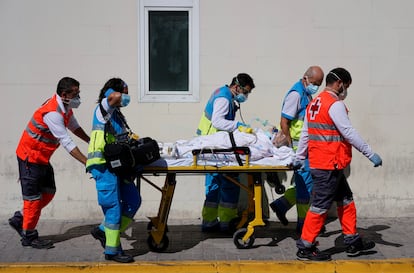Madrid to implement new coronavirus restrictions after pressure from neighboring regions
Castilla y León and Castilla-La Mancha are calling for coordinated action given fears over the exportation of cases from the capital, as took place in the first wave

Since the deescalation of the Spanish government’s coronavirus confinement measures came to an end in June, and control of the epidemic was returned to Spain’s regional governments, the administration in Madrid has pointed to Barajas Airport – which is under the purview of the central government – as a source of new coronavirus infections. The data, however, show that officially just 364 cases have entered via the capital’s main airport since borders were reopened two months ago. Meanwhile, the leaders of neighboring regions were looking at Madrid itself with concern.
Regional premiers of Castilla y León and Castilla-La Mancha have not been able to understand why – with cumulative infection rates over 14 days of 216 and 198 cases per 100,000 inhabitants, respectively, compared to Madrid’s 467.4 – they were suspending the celebration of events and limiting the numbers permitted at social meetings while Madrid was not. Madrid, which is governed by the conservative Popular Party (PP), has not been implementing more measures than those agreed by all regional administrations with the Health Ministry on August 14, such as the closure of nightclubs and bars.
A report by epidemiology experts notes that connections with Madrid was one of five factors that spread the virus in the first wave at the start of the year
But all that is about to change. After a meeting requested this week by Castilla-La Mancha, and attended by representatives from Madrid, Castilla y León and the Health Ministry, Madrid has opted to restrict social meetings further, limiting the capacity of street cafés, events with large numbers of people and funerals. The exact measures have not been announced yet, but the idea is that regions that are very closely interconnected – such as Madrid, Castilla y León and Castilla-La Mancha – should have similar strategies to fight the spread of the coronavirus.
Fernando Rodríguez Artalejo, professor in preventive medicine at Madrid’s Autonomous University, points out that many studies have shown that mobility between regions is one of the major factors in spreading an epidemic. One such report from the National Epidemiology Center pointed to connections with Madrid as being one of five factors that spread the virus in the first wave at the start of the year.
The connections between Madrid and its neighboring provinces include those who live outside the region and travel to the capital to work every day. Segovia and Toledo, for example, are less than half an hour away by train. According to a study from the CSIC public research institute, 300,000 people every day traveled between Madrid, Toledo and Guadalajara before the lockdown in March. Second residences are also common in these neighboring regions, while in the summer, trips to see relatives are constant.
Madrid regional health chief Enrique Ruiz Escudero is due to hold a press conference on Friday to discuss new measures
Castilla-La Mancha has reported that 75% of the outbreaks in its region have their direct or indirect origin in Madrid. The majority of new cases are detected in Toledo and Guadalajara, the two provinces that are connected most closely with the capital.
Fernando Simón, the director of the Health Ministry’s Coordination Center for Health Alerts (CCAES), said on Thursday that Madrid is the region that is causing “most concern” given it has the highest infection rates. He explained that the “adequate measures” are being sought to deal with the situation and that “this will be achieved and the effect will be seen soon.”
Given the situation, the Madrid region is studying a new raft of decisions that the health department is due to present “very soon,” according to a spokesperson. On Friday, health chief Enrique Ruiz Escudero is due to hold a press conference, which was hastily convened on Thursday evening. “The region will take measures according to the epidemiological situation,” he said yesterday during an interview.
For now, however, Health Minister Salvador Illa has ruled out the confinement of the Madrid. Speaking on Thursday during a radio interview, he said that he continued to back “surgical” measures, including the quarantining of specific areas. He also said that such a perimeter confinement of the region “was not appropriate” at the current time.
English version by Simon Hunter.
Tu suscripción se está usando en otro dispositivo
¿Quieres añadir otro usuario a tu suscripción?
Si continúas leyendo en este dispositivo, no se podrá leer en el otro.
FlechaTu suscripción se está usando en otro dispositivo y solo puedes acceder a EL PAÍS desde un dispositivo a la vez.
Si quieres compartir tu cuenta, cambia tu suscripción a la modalidad Premium, así podrás añadir otro usuario. Cada uno accederá con su propia cuenta de email, lo que os permitirá personalizar vuestra experiencia en EL PAÍS.
¿Tienes una suscripción de empresa? Accede aquí para contratar más cuentas.
En el caso de no saber quién está usando tu cuenta, te recomendamos cambiar tu contraseña aquí.
Si decides continuar compartiendo tu cuenta, este mensaje se mostrará en tu dispositivo y en el de la otra persona que está usando tu cuenta de forma indefinida, afectando a tu experiencia de lectura. Puedes consultar aquí los términos y condiciones de la suscripción digital.








































